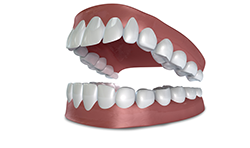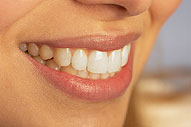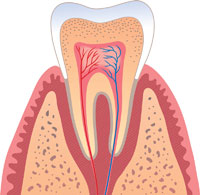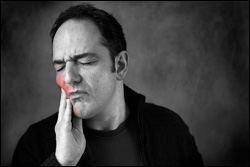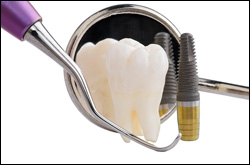Have you ever seen someone’s dental crown and the color and size just don’t match the rest of his or her teeth? It takes so much away from the overall esthetics of that smile, doesn’t it?
At Dental Dimensions, Dr. Deepak Shetty and Dr. Kavita Bhatia insist on dental restorations such as porcelain veneers and dental crowns that match surrounding teeth perfectly, looking natural in color, contours, and size. That’s why they use technologically-advanced computer matching for all their restorative and cosmetic work.

No More Human Error
Let’s face it. Human beings aren’t perfect, and when it comes to color matching restorations, past efforts have fallen short of the aesthetic ideal. The result is patients who live with a crown, veneers, inlays or onlays that make them self-conscious about their smile, particular if the problem is on a front tooth.
In response, cosmetic dentists have developed a computerized system which virtually eliminates human error. The dentists at The Dental Dimensions in South San Jose, California use a hand-held, digital scanner to accurately record the color of teeth surrounding the site of restoration and then translate that color into porcelain.
How Color-Matching Works
The color-matching software takes images from the scanner and translates them into the right formula of porcelain powders to produce materials that are perfect in:
- chroma or color
- hue or subtle gradations of color
- intensity of shade and translucency
This amazing software also helps the technician translate the color, hue and intensity to real-life 3 dimensions. With the help of a digital shade guide, the technician can more precisely adjust the resulting look of the porcelain or composite resin material as it will appear in different lighting situations. He or she then creates the restoration according to the dentist’s treatment plan, assured that the final product will blend in with the rest of the patient’s smile.
Long-lasting, Healthy and Dazzling Smiles
Doctors Shetty and Bhatia, their associate dentist, Dr. May Yoneyama, combine the precise skills of modern restorative, cosmetic and preventative dentistry for a dental practice that is second to none in patient care. They offer a wide range of services, including:
- cleanings, x-rays and examinations
- tooth-colored fillings
- root canal therapy
- dental crowns and implants
- periodontal treatments
- comprehensive care for children through senior adults
- sedation
- orthodontics
Call The Dental Dimensions in South San Jose, California
Would you like to know more about color-matched restorations and how they can improve your smile? Contact the friendly staff today for a consultation:(408) 225-6815.


